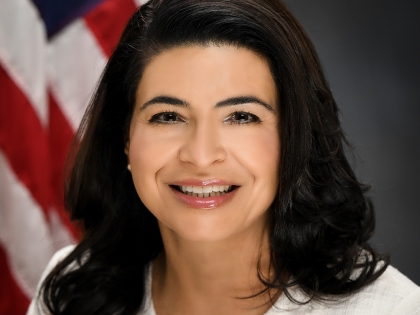
Abortion foes, supporters map next moves after Roe reversal

CHARLESTON, W. Va. - A Texas group that helps women pay for abortions halted its efforts Saturday while evaluating their legal risks under a ban it says will disproportionately hurt poor and minority women. Mississippi's only abortion clinic kept seeing patients while awaiting a 10-day notice that will trigger a ban. And elected officials across the country vowed to take action to protect women's access to abortion.
A day after the Supreme Court's bombshell ruling overturning Roe v. Wade ended the constitutional right to abortion, emotional protests and prayer vigils turned to resolve as several states enacted bans and supporters and foes of abortion rights mapped out their next moves.
In Texas, Cathy Torres, organizing manager for Frontera Fund, a Texas group that helps pay for abortions, said there is a lot of fear and confusion in the Rio Grande Valley near the U.S.-Mexico border, where many people are in the country without legal permission.
That includes how the state's abortion law, which bans the procedure from conception, will be enforced. Under the law, people who help patients get abortions can be fined and doctors who perform them could face life in prison.
"We are a fund led by people of color who will be criminalized first," Torres said, adding that abortion funds like hers that have shut down operations hope to find a way to safely restart. "We just really need to keep that in mind and understand the risk."
Tyler Harden, Mississippi director for Planned Parenthood Southeast, said she spent Friday and Saturday making sure people with impending appointments at the state’s only abortion clinic — which featured in the Supreme Court case — know they don't have to cancel them right away. Abortions can still take place until 10 days after the state attorney general publishes a required administrative notice about the Supreme Court ruling.
Mississippi will ban the procedure except for pregnancies that endanger the woman’s life or those caused by rape reported to law enforcement. The Republican speaker of the Mississippi House, Philip Gunn, said during a news conference Friday that he would oppose adding an exception for pregnancies caused by incest. "I believe that life begins at conception," Gunn said.
Harden said she has been providing information about funds that help people travel out of state to have abortions. Many in Mississippi already were doing so even before the ruling, but that will be even more difficult now that abortions have ended in neighboring states like Alabama. Right now Florida is the nearest "safe haven" for abortion patients, but Harden said "we know that that may not be the case for too much longer."
In Oklahoma, one of 11 states where there are no providers offering abortions and where the nation's strictest law was approved in May, about 15 protesters rallied outside the state Capitol on Saturday.
"I have gone through a wave of emotions in the last 24 hours. ... It’s upsetting, it’s angry, it’s hard to put together everything I’m feeling right now," said Marie Adams, 45.
Having undergone two abortions for ectopic pregnancies, where a fertilized egg is unable to survive, she said the issue is "very personal to me."
"Half the population of the United States just lost a fundamental right," Adams said. "We need to speak up and speak loud."
The ruling is likely to lead to abortion bans in roughly half the states, and people on both sides predicted the fight would continue.
Callie Pruett, who volunteered to escort women into West Virginia’s only abortion clinic before it stopped offering the procedure after Friday’s ruling, said she plans to work to register people to vote in the hope of electing officials who support abortion rights. The executive director of Appalachians for Appalachia added that her organization also will apply for grants to help create a network that will help patients get access to abortion care, including out of state.
"I will say it publicly and I’ll say it now -- I will aid and abet abortion," she said. "We have to create networks of people who are willing to drive people to Maryland or to D.C. That kind of local action requires organization at a level that we have not seen in nearly 50 years."
Since the decision, clinics have stopped performing abortions in Arizona, Alabama, Arkansas, Kentucky, Missouri, South Dakota, West Virginia and Wisconsin. Women considering abortions already had been dealing with the near-complete ban in Oklahoma and a prohibition after roughly six weeks in Texas.
In Ohio, a ban on most abortions from the first detectable fetal heartbeat became law when a federal judge dissolved an injunction that had kept the measure on hold for nearly three years. Another law with narrow exceptions was was triggered by the ruling in Utah and went into effect.
In Minnesota, where abortion remains legal, Gov. Tim Walz signed an executive order to help shield people seeking or providing abortions in his state from facing legal consequences in other states. Walz also has vowed to reject requests to extradite anyone accused of committing acts related to reproductive health care that are not criminal offenses in Minnesota.
"My office has been and will continue to be a firewall against legislation that would reverse reproductive freedom," he said.
In Fargo, North Dakota, the the state’s sole abortion provider plans to move across the river to Minnesota. Red River Women’s Clinic owner Tammi Kromenaker said Saturday that she has secured a location in Moorhead but gave no further details.
Thirteen states, mainly in the South and Midwest, already had laws to ban abortion in the event Roe was overturned. Another half-dozen states have near-total bans or prohibitions after 6 weeks, before many women know they are pregnant.
In roughly a half-dozen other states, including West Virginia and Wisconsin, the fight will be over dormant abortion bans that were enacted before Roe was decided in 1973 or new proposals to sharply limit when abortions can be performed.
Republicans sought to downplay their excitement about winning their decades-long fight, aware that the ruling could energize the Democratic base, particularly suburban women. Carol Tobias, president of National Right to Life, said she expected abortion opponents to turn out in huge numbers this fall, even if Democrats might be motivated by Friday’s ruling.
But Wisconsin’ Gov. Tony Evers, a Democrat, said Saturday he believes the issue will energize independents and he hopes to translate anger over Roe’s demise into votes.
Evers, who was elected by a narrow margin four years ago, also said he supports overturning a 173-year-old state abortion ban, and would not appoint district attorneys who would enforce that law, and would commute prison sentences for anyone convicted under it.
"Any time you take half the people in Wisconsin and make them second-class citizens," Evers said, "I have to believe there’s going to be a reaction to that."



